Hopers & Prayers & Magic-Bean-Buyers
A multi-media glimpse into one semester of the Homestead, the 45-year-old intentional community at Denison University
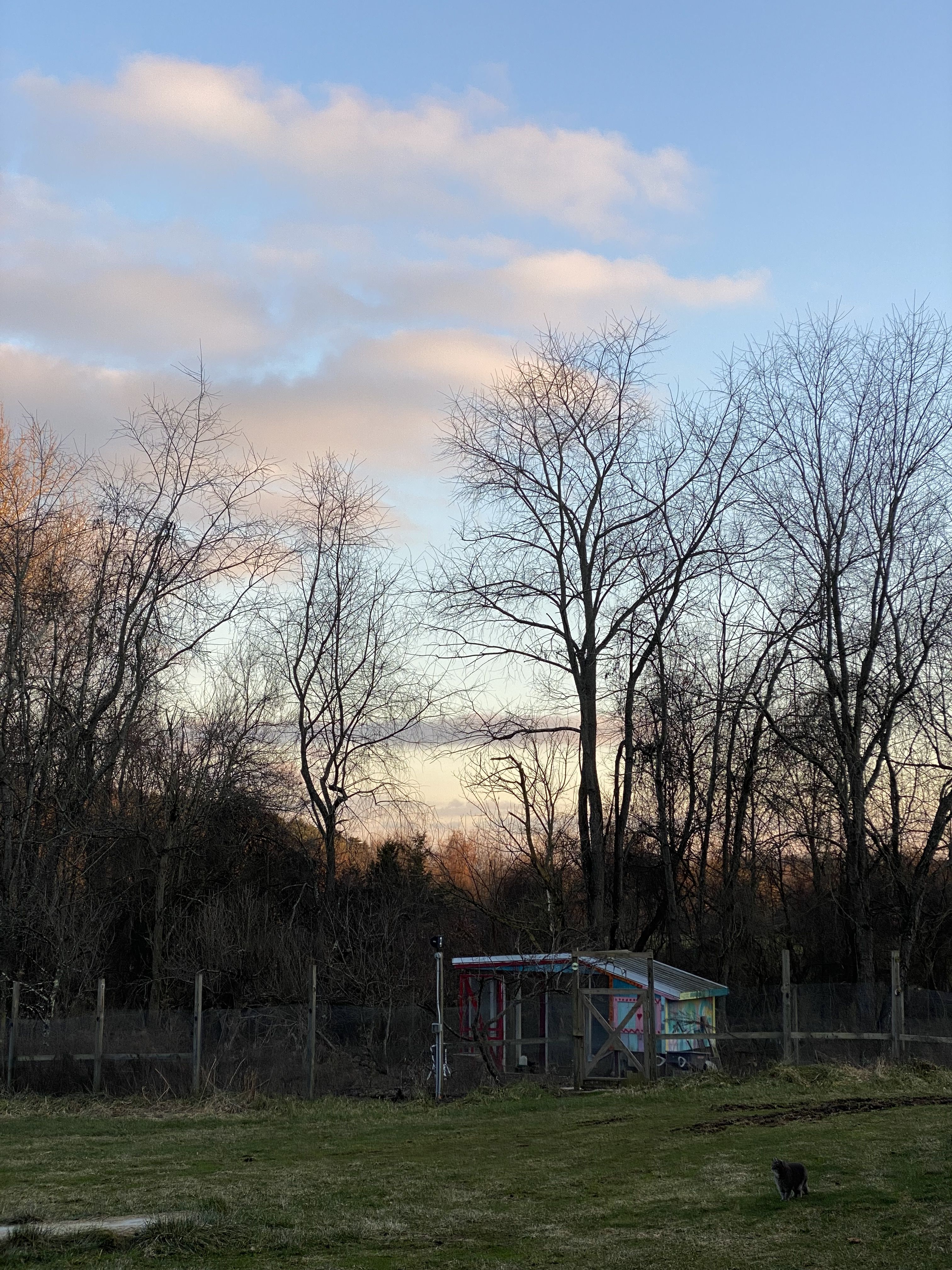
Basil Kahn '22 reflects on his reasons for choosing the Homestead in this mini-doc, which also provides a visual introduction to our home:
Does Anyone Else Care?
Alexis throws one last pinch of salt into the pot of beans. Perfect. She grabs the cowbell from the hook by the door, steps outside, and gives it a shake. Cabin Bob and the rest of the woods echo with a jolly ringing that lets everyone know dinner’s ready. One-by-one people start to pile in from the other cabins. Once the ten of us are here, we gather around the stove for the circling tradition.
“Tonight I warmed up some of the leftover rice and mixed in these veggies,” Alexis announces. “Then I made some naan with wild onions from around the lawn. Oh, and there are also beans.” We all cheer a little, then get in line behind Alexis to fill our plates.
We eat around the twelve-foot wooden table and talk about our days because we know the others care to listen, and we each wash our own dishes.
Scraps go to the chickens or the compost pile; there is no trash can in Cabin Bob.
Listen in while Luna and I cook! Awarded the Best Opossum Honorary Mention at the Denison Podcast-a-thon, this podcast shares an ordinary night of chaos and community cooking at the stead:
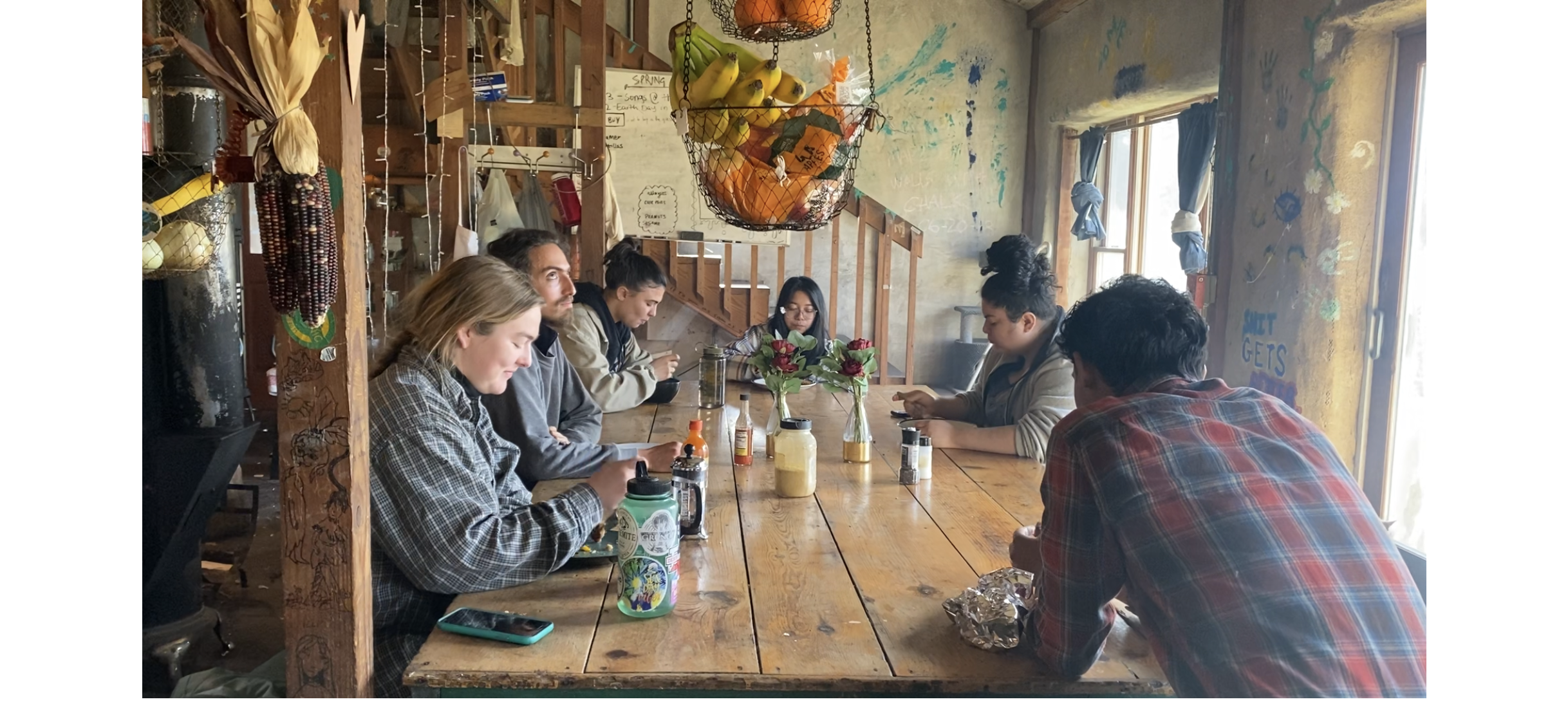
Some nights we hang around in Bob drinking tea and listening to the records left behind by previous Homesteaders. When the weather’s nice we’ll sit outside, maybe share some leftovers with the chickens.
Tonight we wander over to Cabin 1, the only of the original cabins still standing. No one’s lived there for years; it’s more of a museum than anything else. Alexis and I sift through the buckets of left-behind clothes known as the Free Thrift Store while Luna’s flipping through a photobook and Caro’s trying on shiny black thigh-high boots she found under a table.
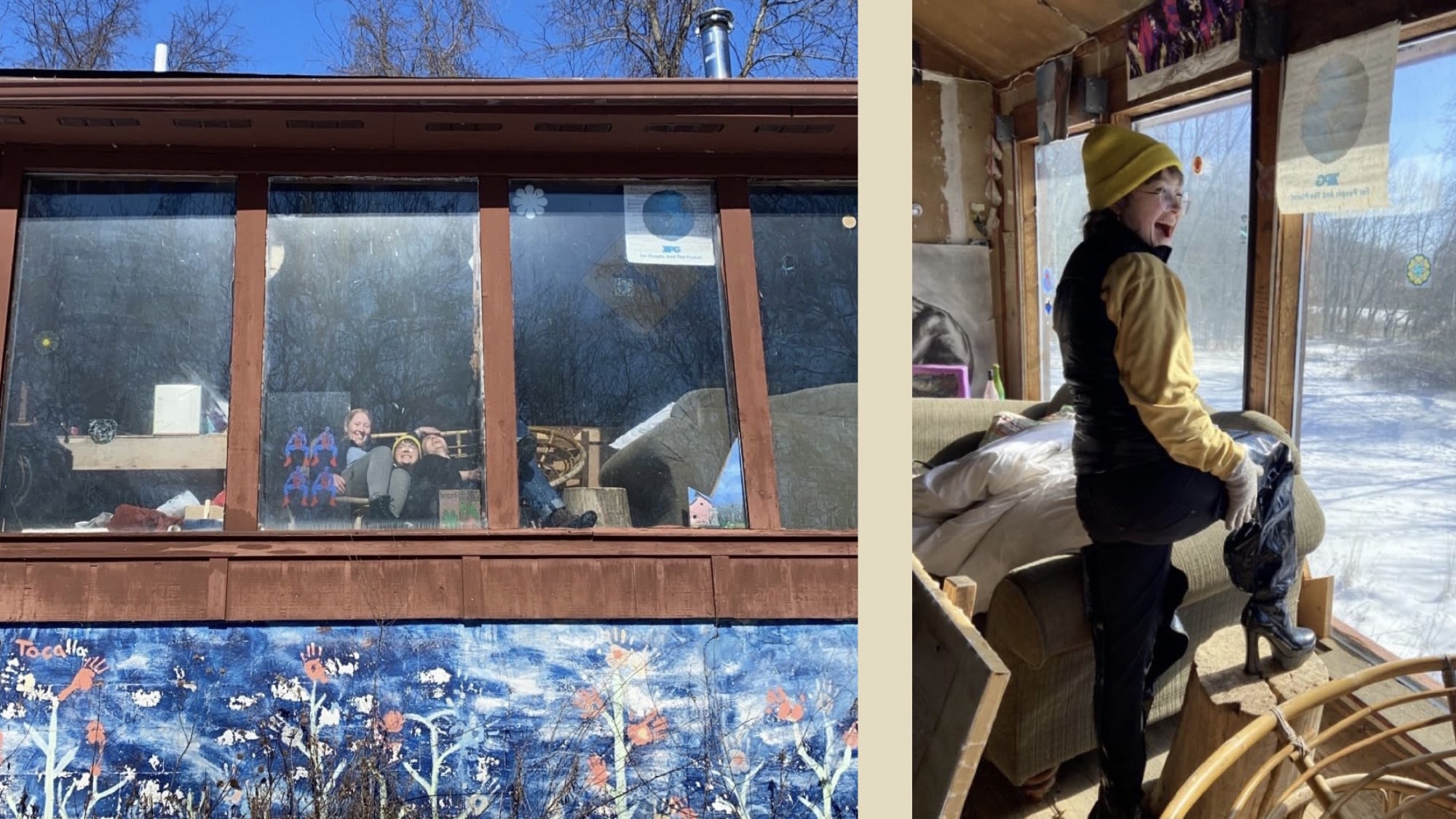
“Hi! Oh my gosh, uh, I’m calling from the Homestead.”
We all look toward Zoe, who’s apparently decided to call one of the dozens of phone numbers scribbled on the walls. She introduces herself as she switches to speakerphone and we all rush over to listen in. A man named Mark is on the other end, a Homesteader from the 2010s who is pleased to hear that his favorite Homestead cat is still around but disappointed to hear we haven’t planted anything in the gardens.
We didn’t tell Mark that no one’s kept up a garden for years. We don’t know exactly how long, but both of the fenced garden areas are completely overgrown with weeds. We also didn’t correct him when he referred to us as “off-the-grid.” We didn’t tell him that the Homestead has actually been using more energy than it’s producing, which we were told was the result of a broken battery part.
Our gardens today, in desperate need of a weeding.
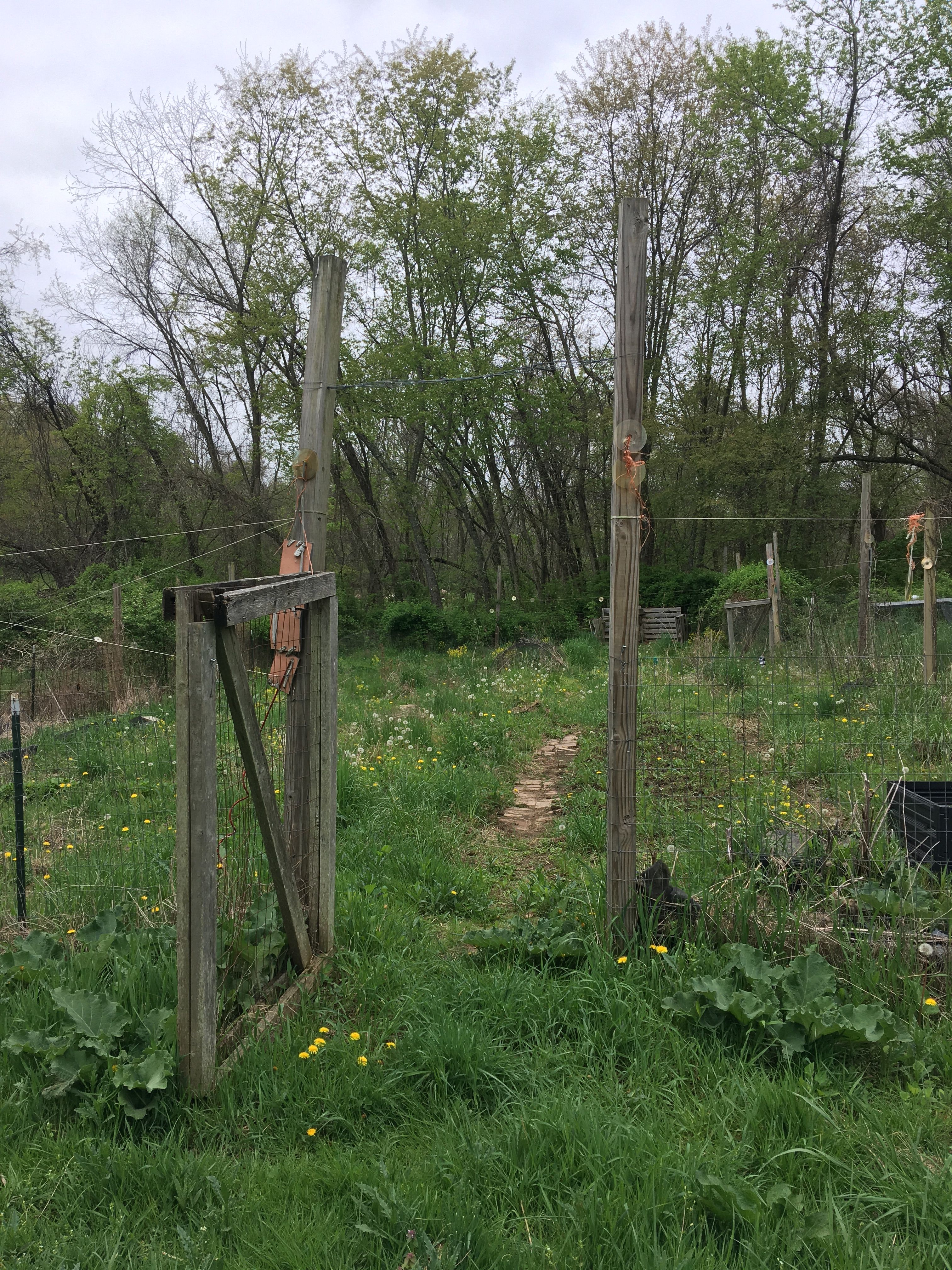
Each semester since 1977, a group of about ten Denison students have lived and worked on this land, striving toward a vision of a Homestead: a college experience that leaves room for mindfulness, for harmony in community, and for an effort to live sustainably. Back in the beginning, it was completely off-grid. Electricity was generated by solar panels on-site, food came almost exclusively from the gardens, and the cabins were kept warm in the winter with a combination of passive solar heating and fire stoves. In 2013, a new insurance code mandated indoor bathrooms, fire suppressant systems tying each residential building to the local power grid, and the discontinuation of fire stoves in bedrooms. The Homestead was no longer off-grid, but for a while the solar panels and intentional consumption practices allowed the site to produce more energy than it was consuming. Until the battery issue.
I brought up the faulty part in a meeting with faculty members on the Homestead Advisory Board once. After a bit of awkward silence, a member of the board spoke up: “Is this a shared concern?” He scanned the room with tired eyes and pursed lips. “Does anyone else care?”
I later reached out to Jeremy King, Denison’s Director of Sustainability & Campus Improvement. I asked him to clarify the efficiency or cost metrics that led to the school’s decision to leave the part nonfunctional. He responded, “I don't know anything regarding the status of the battery system or when it stopped working, but I did hear that was the case.” I asked if he knew who could tell me a bit more. “No idea. You could reach out to Richard Downs.”
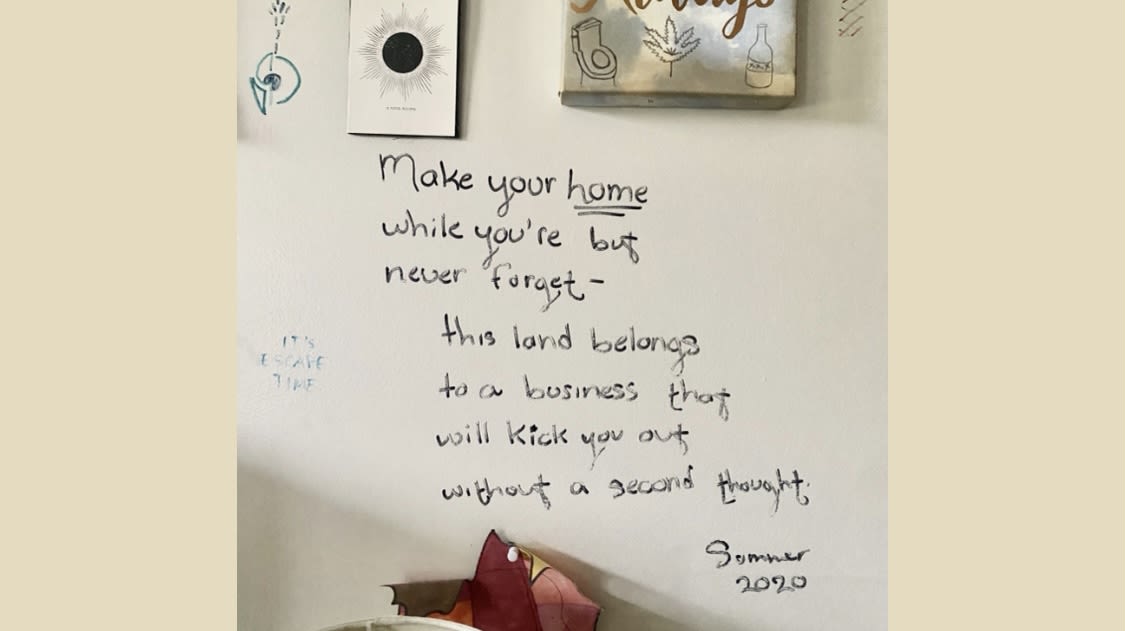
Richard Downs was one of the Denison students in the 70s who worked with Professor Bob Alrutz to create the Homestead. Richard still lives in the area, and he had been involved in reimagining the program after the insurance intervention. He responded quickly, suggesting we discuss the “broken battery part” over the phone.
Richard explained that the initial ties to the power grid were in fact established for the fire suppressant system, but it was meant to be a temporary solution. Solar energy just wasn’t advanced enough at the time to support the system. And Cabin Bob, the non-residential building, was meant to stay off-grid. There were adequate solar panels to realize this. Generally, when a building depends entirely on solar energy, an inverter is installed with the panels. This converts the direct current produced from the Sun to the more household standard alternating current. An inverter wasn’t necessary in Bob, because the lights and fridge were built to run on DC. Then the expensive DC fridge broke. So, the school bought an AC fridge and switched the lights to AC as well.
Richard didn’t know why the school tied Bob to the AC power grid rather than install an inverter to allow the solar panels to power the AC appliances. He guessed that it had to do with availability and cost at the time, but he believed that advances in solar technology rendered a reevaluation long overdue. A quick Google search prices an inverter for our systems at around $1000.
There was never a broken battery part. But for the past seven years, about 10% of the energy produced at the Homestead has gone unutilized.
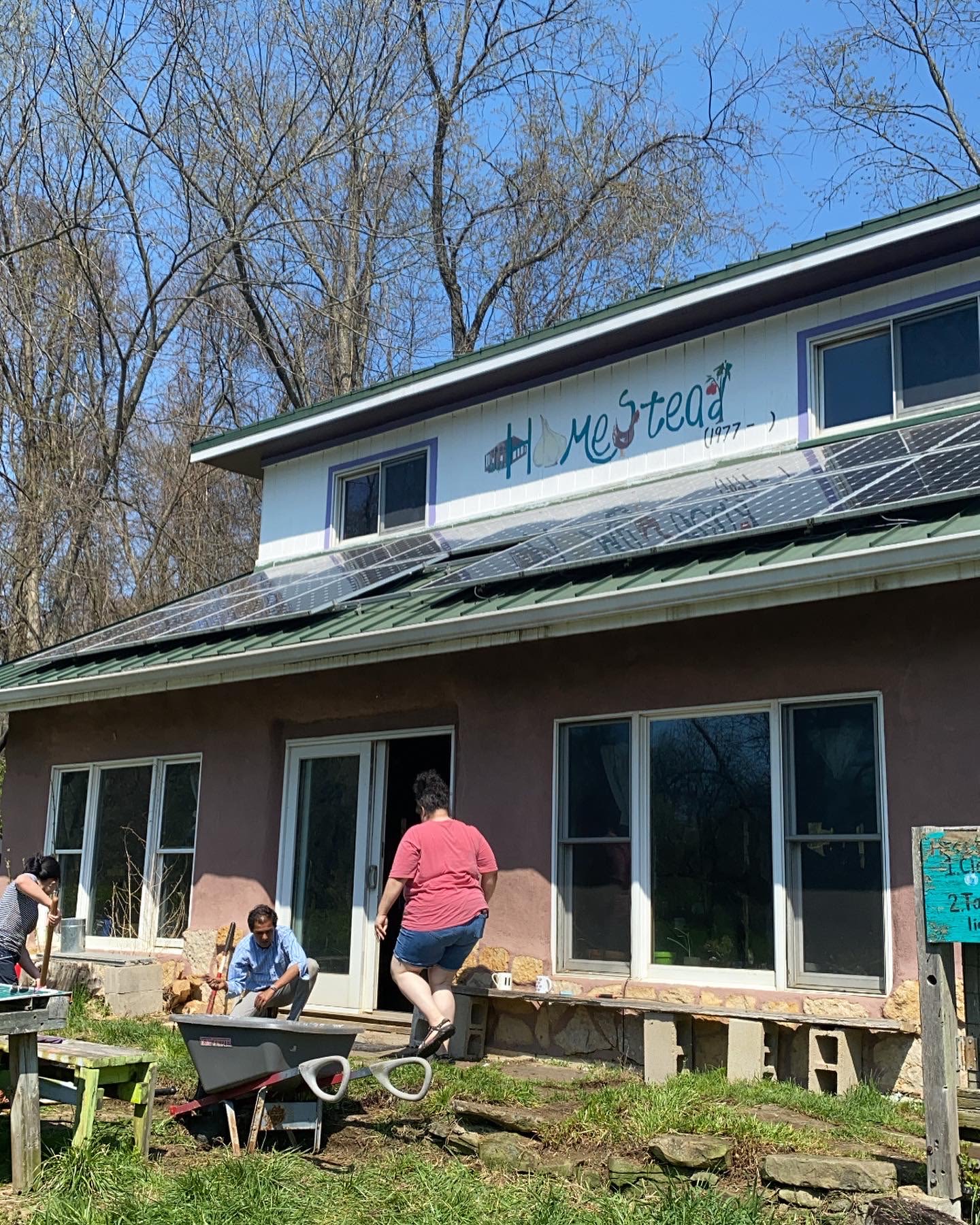
Lynn, Basil, and Luna outside Cabin Bob
Lynn, Basil, and Luna outside Cabin Bob
“It’s all so performative!” I grunt as I yank the axe from the chopping block and swing it over my head to aim again. Luna’s sitting at the table while I get the stove’s fire ready. Her eyes are glued to the bread dough her hands are working, but I can tell from her purposeful breathing and furrowed brows she’s just as bothered.
“A focus on ecological sustainability. That’s what they say about us on their website,” I mumble as I toss the split wood into the firebox. “It feels deceitful.”
Luna scoots me out of the way to set her bread pan in the oven. “You know,” she looks over to me. “We wouldn’t be making a difference anyway.”
I stare at her, waiting.
“It’s like… sure, we generate most of our own power. We bring our own recycling to the recycling center to make sure it actually ends up there, and we pay attention to the ways we use water and electricity and cars. We could be doing more, but even when it was completely off the grid… it’s owned by Denison, and it doesn’t make a very big dent in Denison’s waste or emissions.” She pauses. “And we’re definitely not changing anything on a global scale.”
“You’re right,” I concede, aimlessly stirring the pot of lentils on the stove. “So what’s the point then? My room was 50 degrees last night. I slept in a coat. What’s the point of walking a mile and a half to class every morning? What are we even doing out here?”
“Talking about it.” Luna cracks a smile as if I’ve told a joke. “We’re cooking dinner together, eating together as a community. We’re spending more time outside, appreciating what the Earth has to offer. We’re scooping chicken poop together and mixing the compost– these nine people that probably would have never met otherwise.” She steps into the mudroom and grabs the cowbell from the hook by the door.
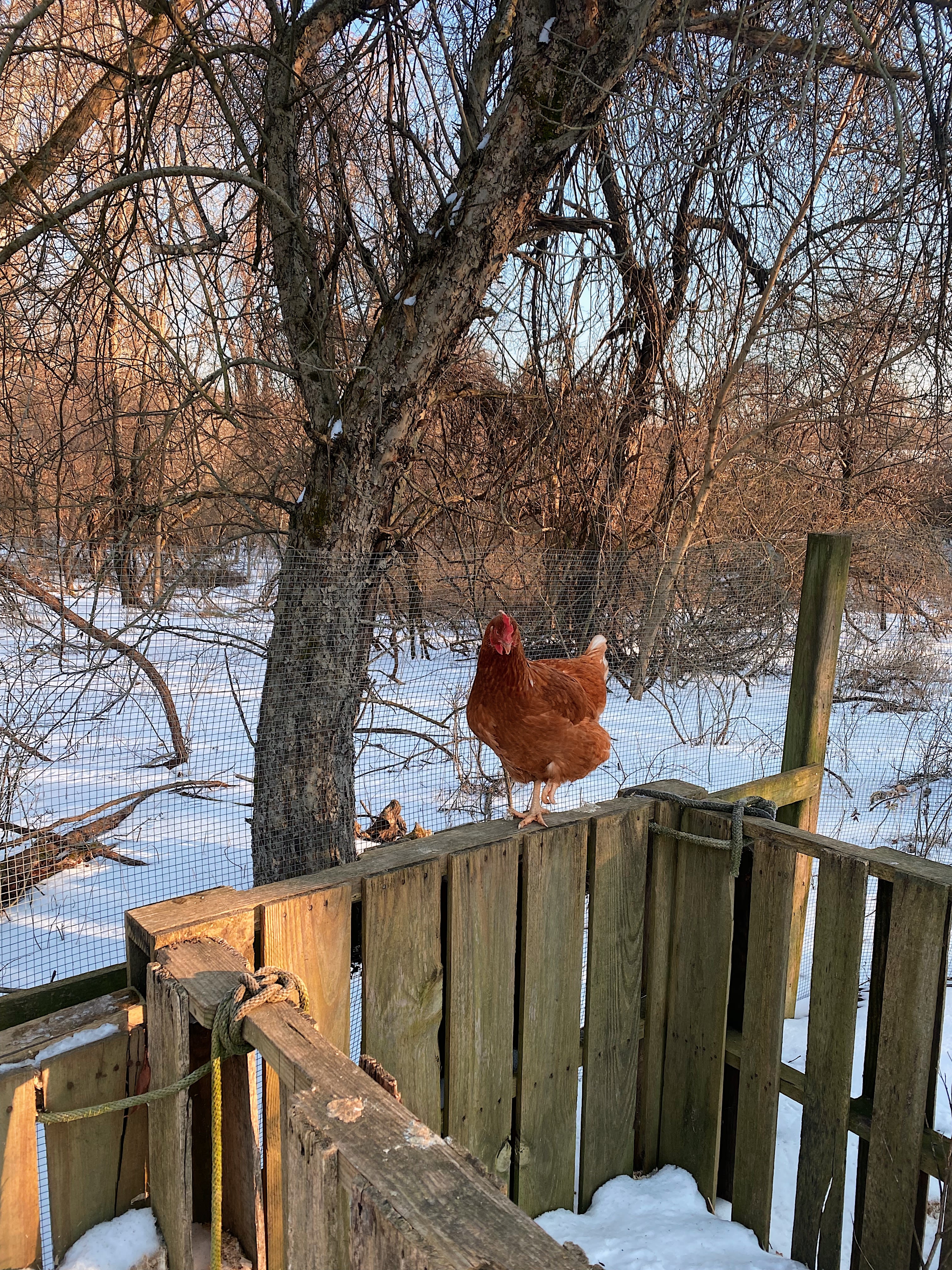
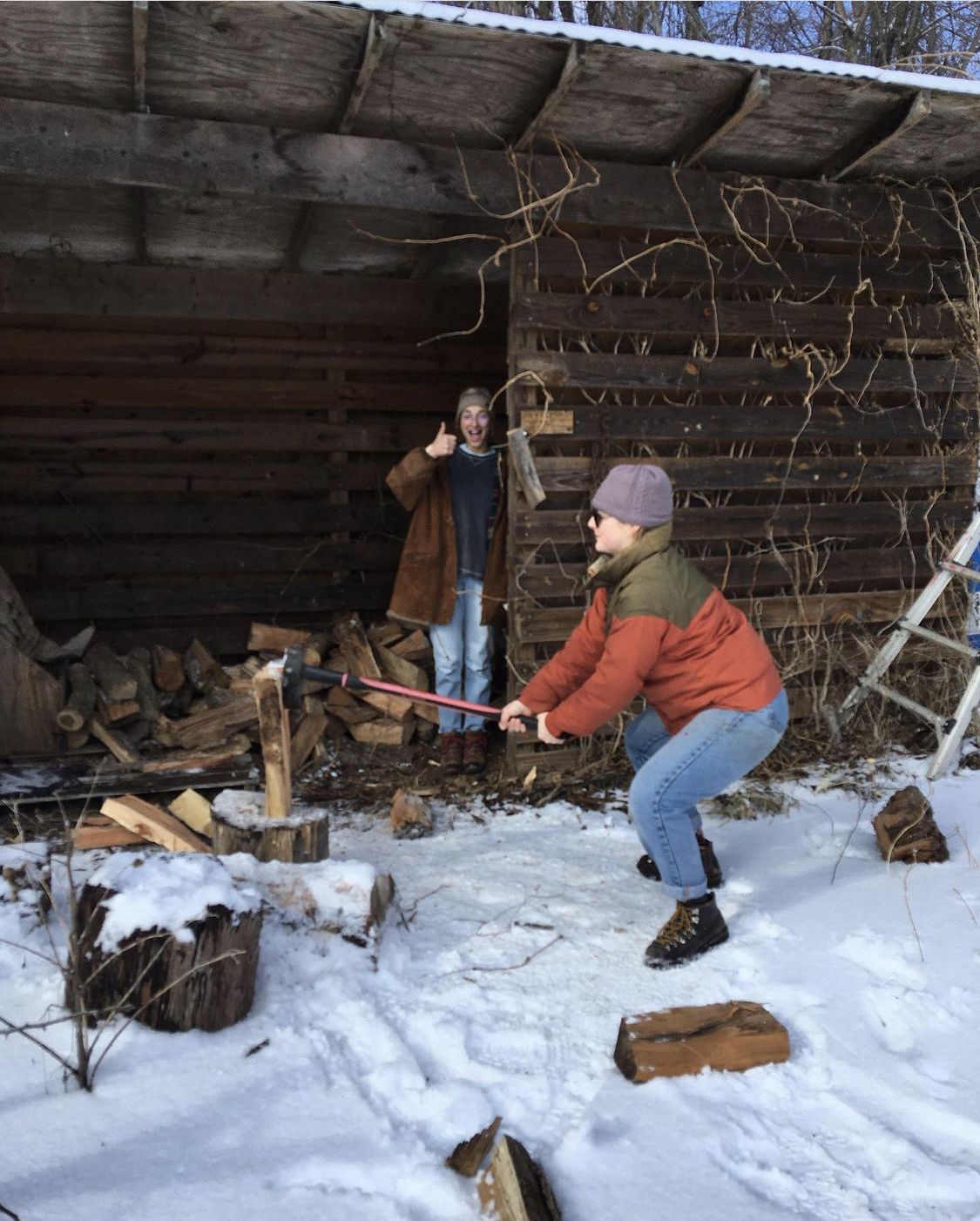
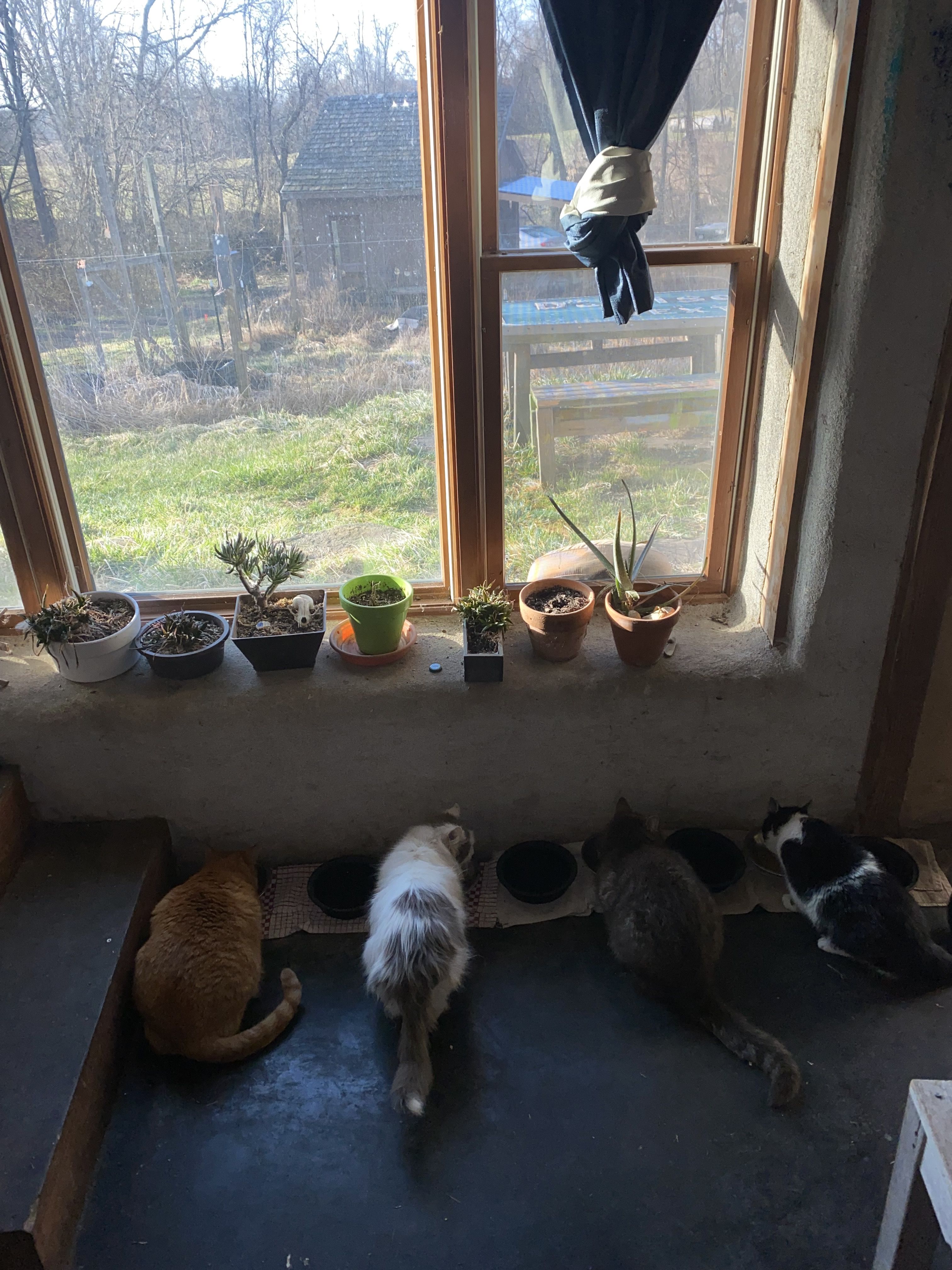



We eat outside tonight. It’s late but the almost-spring Sun is still hanging over the horizon. We just got a rooster named Tennessee, and the chickens have been freaking out all day. We watch like it’s a professional sporting event: intensity builds when Tennessee picks a target to chase in circles, then we all cheer when a chicken manages to escape by hopping onto a low-hanging tree branch or hiding behind a wooden pallet.
I tell the group about the phone call with Richard and his interest in visiting next semester.
I tell them how he wants to work with us to reimagine the Homestead once again, to rethink its impact on the Earth and Denison and us and everyone who came before us and everyone to come after us.
The Sun's setting by this time. We watch the chickens make their way up their ramp and into the wooden shelter. Tennessee watches too, already waiting for a chance to run them in more circles tomorrow.
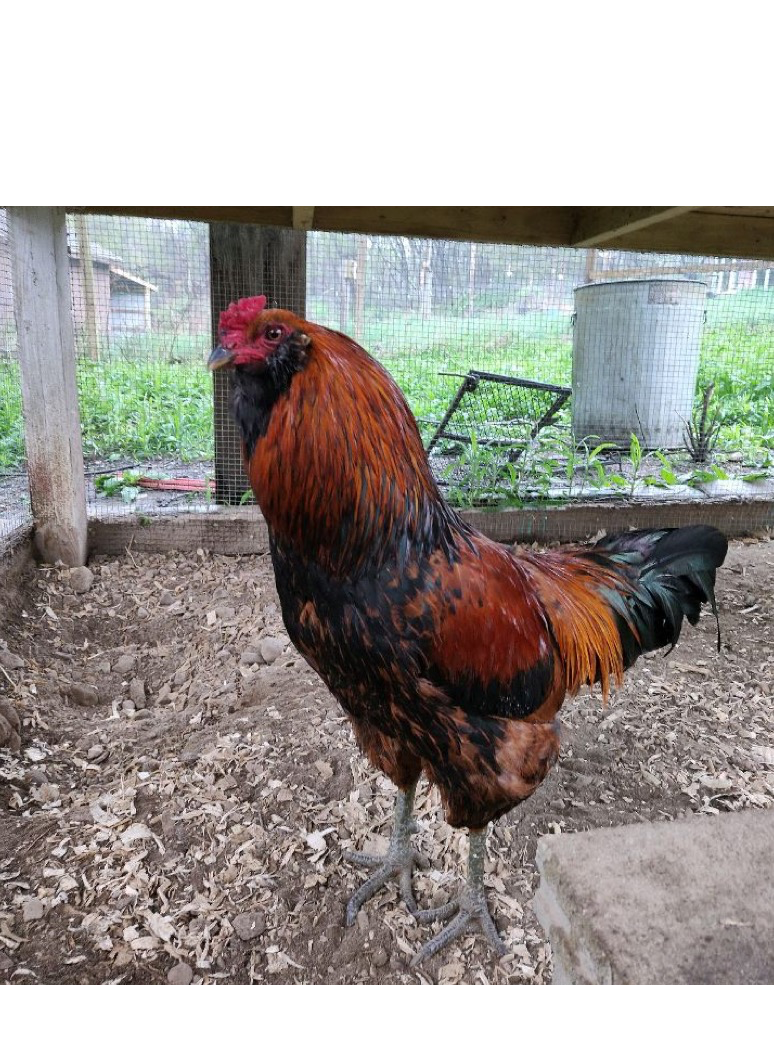
Tennessee the rooster
Tennessee the rooster
Learn more about the Homestead here:
